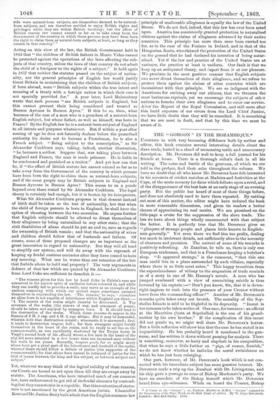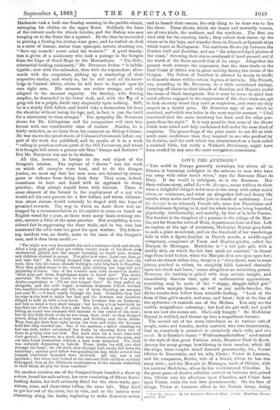THE " GORGON " IN THE MOZAMBIQUE.*
USHERED in with very becoming diffidence both by author and editor, this book contains several interesting details about the slave trade, buried in a cloud of unmeaning tattle and unnecessary description. Mr. Devereux did well to keep a full journal for his friends at home. There is a thorough sailor's dash in all his writing. The noise and bustle of the gunroom, of which we are told in the preface, find their echo throughout the volume. We have no doubt that all who know Mr. Devereux have felt interested in his accounts of cricket matches at Madeira and festivities at the Cape, of the acute memory for dates which follows upon a revel, and of the disappearance of the best hats at an early stage of an evening party. But the public has heard of most of these things before,. and does not absolutely need to have them repeated. By cutting out most of this matter, the editor might have reduced the book to more reasonable dimensions, and given its readers a better chance of appreciating its real merits. We are promised on the title-page a cruise for the suppression of the slave trade. The- less we have about things wholly unconnected with that subject the better. It is perfectly true that Mr. Devereux gives us. " glimpses of strange people and places little known to English- men generally." Yet even there we find him too prolix, dealing too much in irrelevant details, not sufficiently alive to the necessity of clearness and precision. The naivete of some of his remarks is positively refreshing. At Zanzibar, he tells us, there is only one European tradesman, and that is a Frenchman keeping a butcher's shop. "It appeared strange," is the comment, "that this one man could live in a place surrounded by such villains, especially where there is so little meat eaten." This happy transition from the superabundance of villany to the stagnation of trade reminds us of a story in one of Mr. Hannay's novels. A man who has jumped overboard with a view of committing suicide is thus lectured by his captain :—" Don't you know, Sir, that it is down- right impious to rush into the presence of your Creator without leave from the commanding officer?" Another of Mr. Devereux's. remarks quite takes away our breath. The morality of the Sey- chelles Islands is said to be frightful in its depravity. "incest is too common to be taken notice of. One ease, for instance : an official at the hIauritius (born at Seychelles) is the son of his grand- mother by his own brother." If the complication of this incest did not puzzle us, we might well share Mr. Devereux's horror.. But a little reflection will show him that the case he has stated is an impossibility. He has probably heard it mentioned in the gun- room, and has written it down without pausing for analysis. There is something, moreover, so hasty and slapdash in his composition, that when he says a little further on "pigs, of course, flourish," we do not know whether he includes the moral swinishness on which he has just been enlarging.
One part, however, of Mr. Devereux's book which is not con- nected with his immediate subject has some genuine interest. Mr. Devereux made a trip up the Zambesi with Dr. Livingstone, and his ship gave a passage to some of Bishop Mackenzie's party. We have an anecdote of the Bishop himself which Mr. Devereux heard from eye-witnesses. While on board the Pioneer, Bishop
• A Cruise in the " Gorgon" ; or, Eighteen Months on H.M.S. " Gorgon" engaged its the Suppression of the Stave Trade on the East Coast of Africa. By W. Cope Devereux. London: Bell and Daldy. 1569.
Mackenzie took a bath one Sunday morning in the paddle-wheels, arranging his clothes on the upper floats. Suddenly the force of the current made the wheels revolve, and the Bishop was seen hanging on to the floats like a squirrel. By the time he succeeded in gaining a footing his clothes were gone, and he rushed on deck in a state of human, rather than episcopal, nature, shouting out, " Save my cassock ! never mind the trousers!" A good descrip- tion is given of a missionary who took a passage in the Gorgon from the Cape of Good Hope to the Mozambique. "The little, substantial-looking missionary," Mr. Devereux writes, "is indefa- tigable; now with the sailmaker, then with the ropemakers, after- wards with the carpenters, picking up a smattering of their respective trades; and wisely so, for he will need all his know- ledge in Central Africa, where he will have to depend upon his own right arm. His sermons are rather strange, and only adapted to the meanest capacity. On Sunday, with flowing surplice, he descended to the lower deck, and, with the 'Pop of a grog-tub for a pulpit, dwelt very eloquently upon nothing. Still, he is a sturdy little fellow, and would take a tremendous hit from the shoulder without losing his legs, and, in fact, is just the build for a missionary to these savages." The sympathy Mr. Devereux shows for Dr. Livingstone and his companions will earn him favour with one considerable class of readers. Besides, he is fairly orthodox, as we learn from his comment on Bishop Colenso. He was shown the proof-sheets of Colenso's Pentateuch before any part of the work was published, and he speaks of it as a work "calling in question certain parts of the Old Testament, and which it is thought will create a greater stir than 'Essays and Reviews.'" But Mr. Devereux was not to be shaken.
All this, however, is foreign to the real object of the Gorgon's mission. The capture of " dhows " was the work on which all energies were bent, and to do the Gorgon justice, we must say that her men were not deterred by strata- gems or violence from doing their duty. They seem, indeed, sometimes to have met fraud with an approach to sharp practice ; they always repaid force with interest. There is some element of the former in the employment of a spy who would sell his own parents for a few dollars, and whose informa- tion about slavers would certainly be tinged with the hope of promised rewards. The way in which an Arab dhow was en- trapped by a recommendation to its captain to come on board an English vessel for a pass, as there were many boats cruising out- side, savours a little of the same practice. But everything is con- sidered fair in suppressing the slave trade, and in the case last
mentioned the odds were too great for open warfare. The follow- ing incident was, no doubt, more to the taste of the Gorgon's men, and it does them credit :— "The night was very favourable for such a venture—dark and cloudy. After a long quiet pull they got within twenty yards of the dhow, an unobserved, plainly saw the rascals hurrying on board men, women, and children chained in gangs. The pilot now says, 'Land me, then go and take her!' So, having dropped him overboard, he got into the bush, then into his canoe, already waiting to take him back to Zanzibar. They then pulled closer to the vessel, then hoisting her huge sail and preparing to leave. One of the consul's men then shouted in Arabic, 'Haul your sail down, Englishman wants to board yon!' The Arabs answered, No slaves on board, we will not.' Our man= You must ;' Arabs—equivalent to 'I'll see you hanged first!' So they pulled up alongside, and the initee began: seventeen desperate fellows wielded two-handled swords right and left, one of them throwing an assegais just past H—'s head, nearly through the boat. Unluckily they had no rope in the boat to make her fast, and the bowman was therefore obliged to hold on with a boat-hook. The bowman was an Irishman, and had as usual a very short temper ; but having a long boat-hook he knocked one of the Arabs down, and broke his staff, a part of which falling on board was returned with interest to the centre of his chest; but by this little freak of his he lost them their hold : so they dropped astern, firing their rifles as they went, and bowling over three Arabs. They then got their boat right across the bow, and while the bowman held fast they boarded her. One of the marines, a fellow standing six feet one inch, rather astonished the Arabs by shooting down two of them in getting over her bow. The Arab crew for a short time held their ground ; however, in a word, they were driven over the stern, and our men found themselves without a man even scratched. The deck was certainly disgusting to behold. Three Arabs lay stiff, two shot through the head ; the old chief, shot through both knees, fell down the hatchway ; another poor fellow was gurgling his last, while several that jumped overboard wounded were drowned. All this was a sad spectacle ; but when they looked at the innocent little children so lately kidnapped, then at the villainous countenances of the rascals wallowing in their blood, all pity for them vanished."
On another occasion one of the Gorgon's boats boarded a dhow up a river, found her sails unbent, her crew consisting of fifteen fierce- looking Arabs, her hold evidently fitted for the slave trade, pro- visions, arms, and slave-irons telling the same tale. They tried to get her out of the river, but in vain, and as the 'natives were clustering along the banks, beginning to make demoniac noises and to launch their canoes, the only thing to be done was to fire the dhow. These dhows, which are heavy and unwieldy vessels, are of two kinds, the southern and the northern. The first are used only for the coasting trade ; they collect their slaves up the rivers or in the bays, and transfer them to French or Spanish ships which touch at Madagascar. The northern dhows ply between the Persian Gulf and Zanzibar, and are "the acknowledged pirates of the coast," throwing their slaves overboard if hard pressed and if the worth of the dhow exceeds that of its cargo. Altogether the present work conveys the impression that the slave trade on the East Coast of Africa was in great activity during the cruise of the Gorgon. The Sultan of Zanzibar is allowed by treaty to traffic in domestic slaves within certain degrees of latitude. The French, too, according to Mr. Devereux, do a little underhand slaving, carrying off slaves to their islands of Bourbon and Mayotte under the name of black immigrants. But it must be borne in mind that naval officers engaged in the suppression of the slave trade are apt to look on every vessel they meet as suspicious, and every one they suspect as a lawful prize. Mr. Devereux says of one which he searched, and which was laden in the most regular manner, 1 feel convinced that the main hatchway has been used for other pur- poses than the right." It is very possible that some of the dhows which were seized and duly condemned fell under the same kind of suspicion. The proceedings of the prize court do not fill us with much more confidence than they inspired in one who profited by its decision, and the oath which was administered on a book called a nautical bible, but really a Walker's Dictionary, might have been evaded by any save the more scrupalous consciences.































 Previous page
Previous page